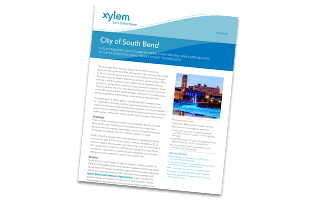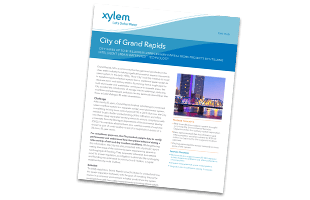Read how the City of South Bend reduced CSO volume by more than 80%, saving $400 million in CapEx spending using “smart sewer” technology.
It looks like you are coming from United States, but the current site you have selected to visit is Ethiopia. Do you want to change site?
- Sign In
- Register
- Request Info
- Find a Location
-
Enable high contrast mode
-
- Select language
- Algeria
- Angola
- Anguilla
- Antigua and Barbuda
- Argentina
- Australia
- Austria
- Azerbaijan
- Bahamas
- Bahrain
- Barbados
- Belgium
- Belize
- Benin
- Bermuda
- Bolivia
- Botswana
- Brazil
- British Virgin Islands
- Bulgaria
- Burkina Faso
- Burundi
- Cabo Verde
- Cameroon
- Canada English
- Canada Français
- Cayman Islands
- Central African Republic
- Chad
- Chile
- China
- Colombia
- Comoros
- Congo
- Congo, Republic of the
- Costa Rica
- Cote d'Ivoire
- Croatia
- Czech Republic
- Denmark
- Djibouti
- Dominican Republic
- Dominicana
- Ecuador
- Egypt
- El Salvador
- Equatorial Guinea
- Eritrea
- Eswatini
- Ethiopia
- Europe
- Finland
- France
- Gabon
- Gambia
- Germany
- Ghana
- Greece
- Grenada
- Guadeloupe
- Guatemala
- Guinea
- Guinea-Bissau
- Guyana
- Haiti
- Honduras
- Hong Kong
- Hungary
- India
- Indonesia
- Iraq
- Ireland
- Israel
- Italy
- Jamaica
- Japan
- Jordan
- Kazakhstan
- Kenya
- Korea
- Kuwait
- Lebanon
- Lesotho
- Liberia
- Libya
- Lithuania
- Madagascar
- Malawi
- Malaysia
- Mali
- Martinique
- Mauritania
- Mauritius
- Mexico
- Mongolia
- Montserrat
- Morocco
- Mozambique
- Namibia
- Netherlands
- New Zealand
- Nicaragua
- Niger
- Nigeria
- Norway
- Oman
- Panama
- Paraguay
- Peru
- Philippines
- Poland
- Portugal
- Puerto Rico
- Qatar
- Romania
- Rwanda
- Saint Kitts and Nevis
- Saint Lucia
- Saint Vincent and the Grenadines
- Sao Tome and Principe
- Saudi Arabia
- Senegal
- Seychelles
- Sierra Leone
- Singapore
- Slovakia
- Somalia
- South Africa and Sub-Saharan Africa
- South Sudan
- Spain
- Sudan
- Sweden
- Taiwan
- Tanzania
- Thailand
- Togo
- Trinidad and Tobago
- Tunisia
- Turkey
- U.A.E
- U.S. Virgin Islands
- Uganda
- Ukraine
- United Kingdom
- United States
- Uruguay
- Uzbekistan
- Venezuela
- Vietnam
- Yemen
- Zambia
- Zimbabwe
Webinar: How Three US Utilities Are Using Smart Technology to Address Wastewater Regulations

Join Chicago Water Week and Xylem to hear how three mid-western communities have implemented intelligent watershed technology to optimize their existing sewer system and solve regulatory challenges by maximizing the utilization of their existing assets. We will also explore how these cities are using wastewater network and treatment system optimization solutions to mitigate challenges such as wet weather overflows and odor control to protect community health, while avoiding costly capital improvement projects and saving millions in wastewater system operations and maintenance. We will also hear how these cities overcame barriers to adopting smart technology and gain a better understanding of best practices that can be adopted by other utilities.
Hear from these utility leaders how they were able to:
- Navigate internal buy-in to use digital technologies
- Coordinate with stakeholders throughout their projects
- Pull together relevant data and resources required
- Fully understand pertinent regulations
- Develop and build a strategy to deliver results for their community
Speakers:
 Lindsay Birt (Moderator)
Lindsay Birt (Moderator)
Client Solutions Manager, Key Accounts
Xylem
Dr. Lindsay Birt, Client Solutions Manager, has extensive experience in water resource engineering, including nutrient management, in stream water quality monitoring and modeling, storm water management, sustainable design and performance assessments, geospatial information systems, stakeholder engagement and decision making, watershed management, and digital solutions for collections systems and wastewater treatment. She currently serves as the Watershed Committee Chair for the Illinois Water Environment Association. Dr. Birt completed a Ph.D. in Agricultural and Biological Engineering from Purdue University with an emphasis in Environmental & Natural Resources Engineering. She holds a M.S. and B.S. in Biological and Agricultural Engineering from Texas A&M University.
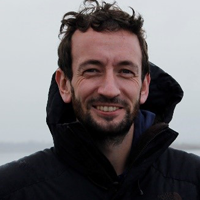 Kieran Fahey
Kieran Fahey
Director, Long-Term Control Plan
City of South Bend, Indiana
Kieran Fahey is the City of South Bend’s long-term control plan Director. A native of Ireland, he previously spent a decade with the Irish EPA. He also worked with the Irish Government’s Department of Agriculture and as a consultant on a range of environmental engineering assignments throughout the European Union and Middle-East. He is an environmental scientist and an engineer. He lives in South Bend with his wife and daughter. Kieran is currently reimagining, rewriting and renegotiating the remaining 85% of South Bend’s $860 million CSO long-term control plan.
J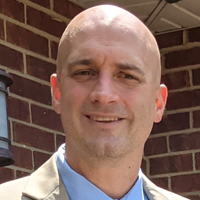 onathan Grabowy
onathan Grabowy
Managing Civil Engineer
MWRD of Greater Chicago
Jonathan Grabowy joined the Metropolitan Water Reclamation District in 1999, as an Assistant Structural Engineer in the Process Facilities Design Division of the Engineering Department. Since that time, he has as worked in various area including local sewers permitting, engineering planning, civil design, stormwater management, and capital facility planning. Currently, he is the Managing Civil Engineer that oversees Capital Facilities Planning, Wastewater Research and New Technology Evaluation programs for the MWRD. Significant accomplishments in Jonathan’s career include – overseeing the Calumet Sag Channel and Poplar Creek Detailed Watershed Plans, MWRD’s Stormwater GIS Inundation Application, Long-term Capital Facilities Planning, Biosolids Planning, Districtwide Odor Reduction Planning and Capital Project Vetting. Jonathan is currently overseeing the Development of the MWRD’s Sustainability and Resiliency Plan and Climate Action Plan, wastewater research and capital planning efforts and new technology evaluations for items that cover both strategic and regulatory drivers for the organization.
Jonathan is active in the WEF Odor and Air Pollutants committee and participates in the NACWA Climate & Resiliency Committee. He has his professional engineer licenses in Illinois and Wisconsin and has a Bachelor of Science in Civil Engineering from Purdue University, Master of Science in Computer Science, Telecommunication and Information System from De Paul University, and a Master of Engineering Management from Northwestern University.
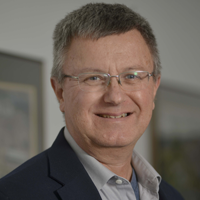 Charles Schroeder, P.E.
Charles Schroeder, P.E.
Assistant Environmental Services Manager
City of Grand Rapids, MI
Mr. Schroeder has been in the Civil engineering field for 30+ years. As a design engineer / project manager with a private consultant firm for 16 years, he was involved with numerous phases of infrastructure projects ranging from initial field investigation to final construction record drawings. Drainage studies, combined sewer separation, water system modeling, highway design, and treatment plant optimization are just some of the many projects he has experience with. For the past 23 years, he has been employed by the City of Grand Rapids, first as the Hydraulic Engineer and currently as the Assistant Environmental Services Manager located at the Water Resource Recovery Facility (WRRF). Among his many accomplishments, he has most recently been involved with the design, construction and start-up of the facilities new $82 million bio-digester complex. He has been heavily involved in all aspects of public works projects especially wastewater, stormwater and the ever changing regulations which the City permits must adhere to. He is a member of the American Society of Civil Engineers, the National Society of Professional Engineers, the American Public Works Association, the Michigan Water Environment Association and is a licensed Professional Engineer in the State of Michigan.
Certifications include:
NASSCO – PAC, LAC and MAC.
APICS the Association for Operations Management – Basics of Supply Chain Mgmt.
Michigan State Police, Emergency Management Division – Unified Incident Command System.
MDEQ – Part 91 Soil Erosion and Sedimentation Control
Details
Location
OnlineWatch webinar
All fields required.
Looks like you are offline, your form will be sent as soon as you get back online.
Read South Bend case study
Read Grand Rapids case study
Read how the City of Grand Rapids saved one billion dollars using intelligent urban watershed technology to solve infiltration and inflow problem.
Learn more about Xylem Vue powered by GoAigua's SSO/CSO Prediction and Prevention

Learn more about Xylem Vue powered by GoAigua's smart, end-to-end wastewater system that helps utilities optimize networks and operations at significantly lower costs.
Learn more about Xylem Vue powered by GoAigua's Plant Real-Time Decision Support

Learn how Xylem Vue powered by GoAigua's Plant Real-Time Decision Support can help your utility save energy, minimize chemical consumption, and deliver better quality water and results.
Learn more about Xylem Vue powered by GoAigua's SSO/CSO Prediction and Prevention

Learn more about Xylem Vue powered by GoAigua's smart, end-to-end wastewater system that helps utilities optimize networks and operations at significantly lower costs.
Take the next step to optimizing your wastewater networks
Start analyzing your wastewater networks to improve operational efficiency and reduce costs.
- Privacy Policy
- Terms & Conditions
- Update Preferences
- Copyright 2025 Xylem. All Rights Reserved.

